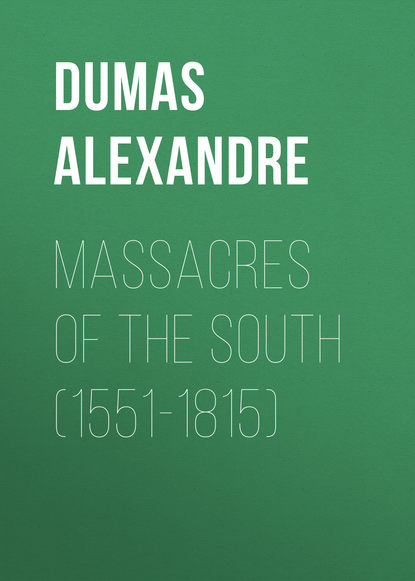По всем вопросам обращайтесь на: info@litportal.ru
(©) 2003-2024.
✖
Massacres of the South (1551-1815)
Настройки чтения
Размер шрифта
Высота строк
Поля
Instantly the colonel ordered the ‘gineyale’ to sound: the town guards assumed arms, the troops left the barracks and formed in line, the National Guards in the rear of the regular troops, and when they were all thus drawn up; the order of the day was read; it was then snatched out of the colonel’s hands, printed on large placards, and in less time than seemed possible it was posted up in every street and at every street corner; the tricolour replaced the white cockade, everyone being obliged to wear the national emblem or none at all, the city was proclaimed in a state of seige, and the military officers formed a vigilance committee and a police force.
While the Duc d’Angouleme had been staying at Nimes, General Gilly had applied for a command in that prince’s army, but in spite of all his efforts obtained nothing; so immediately after the dinner at which he was insulted he had withdrawn to Avernede, his place in the country. He was awoke in the night of the 5th-6th April by a courier from General Ambert, who sent to offer him the command of the 2nd Subdivision. On the 6th, General Gilly went to Nimes, and sent in his acceptance, whereby the departments of the Gard, the Lozere, and Ardeche passed under his authority.
Next day General Gilly received further despatches from General Ambert, from which he learned that it was the general’s intention, in order to avoid the danger of a civil war, to separate the Duc d’Angouleme’s army from the departments which sympathised with the royal cause; he had therefore decided to make Pont-Saint-Esprit a military post, and had ordered the 10th Regiment of mounted chasseurs, the 13th artillery, and a battalion of infantry to move towards this point by forced marches. These troops were commanded by Colonel Saint-Laurent, but General Ambert was anxious that if it could be done without danger, General Gilly should leave Nimes, taking with him part of the 63rd Regiment, and joining the other forces under the command of Colonel Saint-Laurent, should assume the chief command. As the city was quite tranquil, General Gilly did not hesitate to obey this order: he set out from Nimes on the 7th, passed the night at Uzes, and finding that town abandoned by the magistrates, declared it in a state of siege, lest disturbances should arise in the absence of authority. Having placed M. de Bresson in command, a retired chief of battalion who was born in Uzes, and who usually lived there, he continued his march on the morning of the 8th.
Beyond the village of Conans, General Gilly met an orderly sent to him by Colonel Saint-Laurent to inform him that he, the colonel, had occupied Pont Saint-Esprit, and that the Duc d’Angouleme, finding himself thus caught between two fires, had just sent General d’Aultanne, chief of staff in the royal army, to him, to enter into negotiations for a surrender. Upon this, General Gilly quickened his advance, and on reaching Pont-Saint-Esprit found General d’Aultanne and Colonel Saint-Laurent conferring together at the Hotel de la Poste.
As Colonel Saint-Laurent had received his instructions directly from the commander-in-chief, several points relating to the capitulation had already been agreed upon; of these General Gilly slightly altered some, and approved of the others, and the same day the following convention was signed:
“Convention concluded between General Gilly and Baron de Damas
“S.A.R. Mgr. le Duc d’Angouleme, Commander-in-Chief of the royal army in the South, and Baron de Gilly, General of Division and Commander-in-Chief of the first corps of the Imperial Army, being most anxiously desirous to prevent any further effusion of French blood, have given plenary powers to arrange the terms of a convention to S.A.R. M. le Baron de Damas, Field-Marshal and Under-Chief of Staff, and General de Gilly and Adjutant Lefevre, Chevalier of the Legion of Honour, and Chief of the Staff of the first Army Corps; who, having shown each other their respective credentials, have agreed on the following terms: —
“Art. 1. The royal army is to be disbanded; and the National Guards which are enrolled in it, under whatever name they may have been levied, will return to their homes, after laying down their arms. Safe conducts will be provided, and the general of division commanding-in-chief guarantees that they shall never be molested for anything they may have said or done in connection with the events preceding the present convention.
“The officers will retain their swords; the troops of the line who form part of this army will repair to such garrisons as may be assigned to them.
“Art. 2. The general officers, superior staff officers and others of all branches of the service, and the chiefs and subordinates of the administrative departments, of whose names a list will be furnished to the general-in-chief, will retire to their homes and there await the orders of His Majesty the Emperor.
“Art. 3. Officers of every rank who wish to resign their commissions are competent to do so. They will receive passports for their homes.
“Art. 4. The funds of the army and the lists of the paymaster-general will be handed over at once to commissioners appointed for that purpose by the commander-in-chief.
“Art. 5. The above articles apply to the corps commanded by Mgr. le Duc d’Angouleme in person, and also to those who act separately but under his orders, and as forming part of the royal army of the South.
“Art. 6. H.R.H. will post to Cette, where the vessels necessary for him and his suite will be waiting to take him wherever he may desire. Detachments of the Imperial Army will be placed at all the relays on the road to protect His Royal Highness during the journey, and the honours due to his rank will be everywhere paid him, if he so desire.
“Art. 7. All the officers and other persons of His Royal Highness’ suite who desire to follow him will be permitted to do so, and they may either embark with him at once or later, should their private affairs need time for arrangement.
“Art. 8. The present treaty will be kept secret until His Royal Highness have quitted the limits of the empire.
“Executed in duplicate and agreed upon between the above-mentioned plenipotentiaries the 8th day of April in the year 1815, with the approval of the general commanding-in-chief, and signed,
“At the headquarters at Pont-Saint-Esprit on the day and year above written.
“(Signed) LEFEVRE Adjutant and Chief of Staff of the First Corps of the Imperial Army of the South
“(Signed) BARON DE DAMAS Field-Marshal and Under-Chief of Staff
“The present convention is approved of by the General of Division Commanding-in-Chief the Imperial Army of the South.
“(Signed) GILLY”
After some discussion between General Gilly and General Grouchy, the capitulation was carried into effect. On the 16th April, at eight o’clock in the morning, the Duc d’Angouleme arrived at Cette, and went on board the Swedish vessel Scandinavia, which, taking advantage of a favourable wind, set sail the same day.
Early in the morning of the 9th an officer of high rank had been sent to La Palud to issue safe-conducts to the troops, who according to Article I of the capitulation were to return home “after laying down their arms.” But during the preceding day and night some of the royal volunteers had evaded this article by withdrawing with their arms and baggage. As this infraction of the terms led to serious consequences, we propose, in order to establish the fact, to cite the depositions of three royal volunteers who afterwards gave evidence.
“On leaving the army of the Duc d’Angouleme after the capitulation,” says Jean Saunier, “I went with my officers and my corps to Saint-Jean-des-Anels. From there we marched towards Uzes. In the middle of a forest, near a village, the name of which I have forgotten, our General M. de Vogue told us that we were all to return to our own homes. We asked him where we should deposit the flag. Just then Commandant Magne detached it from the staff and put it in his pocket. We then asked the general where we should deposit our arms; he replied, that we had better keep them, as we should probably find use for them before long, and also to take our ammunition with us, to ensure our safety on the road.
“From that time on we all did what we thought best: sixty-four of us remained together, and took a guide to enable us to avoid Uzes.”
Nicholas Marie, labourer, deposed as follows:
“On leaving the army of the Duc d’Angouleme after the capitulation, I went with my officers and my corps to Saint-Jean-des-Anels. We marched towards Uzes, but when we were in the middle of a forest, near a village the name of which I have forgotten, our general, M. de Vogue, told us that we were to go to our own homes as soon as we liked. We saw Commandant Magne loose the flag from its staff, roll it up and put it in his pocket. We asked the general what we were to do with our arms; he replied that we were to keep both them and our ammunition, as we should find them of use. Upon this, our chiefs left us, and we all got away as best we could.”
“After the capitulation of the Duc d’Angouleme I found myself,” deposes Paul Lambert, lace-maker of Nimes, “in one of several detachments under the orders of Commandant Magne and General Vogue. In the middle of a forest near a village, the name of which I do not know, M. de Vogue and the other officer, told us we might go home. The flag was folded up, and M. Magne put it in his pocket. We asked our chiefs what we were to do with our arms. M. de Vogue told us that we had better keep them, as we should need them before very long; and in any case it would be well to have them with us on the road, lest anything should happen to us.”
The three depositions are too much alike to leave room for any doubt. The royal volunteers contravened Article I of the convention.
Being thus abandoned by their chiefs, without general and without flag, M. de Vogue’s soldiers asked no further counsel of anyone but themselves, and, as one of them has already told us, sixty-four of them joined together to hire a guide who was to show them how to get by Uzes without going through it, for they were afraid of meeting with insult there. The guide brought them as far as Montarem without anyone opposing their passage or taking notice of their arms.
Suddenly a coachman named Bertrand, a confidential servant of Abbe Rafin, former Grand-Vicar of Alais, and of Baroness Arnaud-Wurmeser (for the abbe administered the estate of Aureillac in his own name and that of the baroness), galloped into the village of Arpaillargues, which was almost entirely Protestant and consequently Napoleonist, announcing that the miquelets (for after one hundred and ten years the old name given to the royal troops was revived) were on the way from Montarem, pillaging houses, murdering magistrates, outraging women, and then throwing them out of the windows. It is easy to understand the effect of such a story. The people gathered together in groups; the mayor and his assistant being absent, Bertrand was taken before a certain Boucarut, who on receiving his report ordered the generale to be beaten and the tocsin to be rung. Then the consternation became general: the men seized their muskets, the women and children stones and pitchforks, and everyone made ready to face a danger which only existed in the imagination of Bertrand, for there was not a shadow of foundation for the story he had told.
While the village was in this state of feverish excitement the royal volunteers came in sight. Hardly were they seen than the cry, “There they are! There they are!” arose on all sides, the streets were barricaded with carts, the tocsin rang out with redoubled frenzy, and everyone capable of carrying arms rushed to the entrance of the village.
The volunteers, hearing the uproar and seeing the hostile preparations, halted, and to show that their intentions were peaceful, put their shakos on their musket stocks and waved them above their heads, shouting that no one need fear, for they would do no harm to anyone. But alarmed as they were by the terrible stories told by Bertrand, the villagers shouted back that they could not trust to such assurances, and that if they wanted to pass through the village they must first give up their weapons. It may easily be imagined that men who had broken the convention in order to keep their weapons were not likely to give them up to these villagers – in fact, they obstinately refused to let them out of their hands, and by doing so increased the suspicions of the people. A parley of a very excited character took place between M. Fournier for the royal guards and M. Boucarut, who was chosen spokesman by the villagers. From words they came to deeds: the miquelets tried to force their way through, some shots were fired, and two miquelets, Calvet and Fournier, fell. The others scattered, followed by a lively discharge, and two more miquelets were slightly wounded. Thereupon they all took to flight through the fields on either side of the road, pursued for a short distance by the villagers, but soon returned to examine the two wounded men, and a report was drawn up by Antoine Robin, advocate and magistrate of the canton of Uzes, of the events just related.
This accident was almost the only one of its kind which happened during the Hundred Days: the two parties remained face to face, threatening but self-controlled. But let there be no mistake: there was no peace; they were simply awaiting a declaration of war. When the calm was broken, it was from Marseilles that the provocation came. We shall efface ourselves for a time and let an eye-witness speak, who being a Catholic cannot be suspected of partiality for the Protestants.
“I was living in Marseilles at the time of Napoleon’s landing, and I was a witness of the impression which the news produced upon everyone. There was one great cry; the enthusiasm was universal; the National Guard wanted to join him to the last man, but Marshal Massena did not give his consent until it was too late, for Napoleon had already reached the mountains, and was moving with such swiftness that it would have been impossible to overtake him. Next we heard of his triumphal entry into Lyons, and of his arrival in Paris during the night. Marseilles submitted like the rest of France; Prince d’Essling was recalled to the capital, and Marshal Brune, who commanded the 6th corps of observation, fixed his headquarters at Marseilles.
“With quite incomprehensible fickleness, Marseilles, whose name during the Terror had been, as one may say, the symbol of the most advanced opinions, had become almost entirely Royalist in 1815. Nevertheless, its inhabitants saw without a murmur the tricolour flag after a year’s absence floating once more above the walls. No arbitrary interference on the part of the authorities, no threats, and no brawling between the citizens and the soldiers, troubled the peace of old Phocea; no revolution ever took place with such quietness and facility.
“It must, however, be said, that Marshal Brune was just the man to accomplish such a transformation without friction; in him the frankness and loyalty of an old soldier were combined with other qualities more solid than brilliant. Tacitus in hand, he looked on at modern revolutions as they passed, and only interfered when the, voice of his country called him to her defence. The conqueror of Harlem and Bakkun had been for four years forgotten in retirement, or rather in exile, when the same voice which sent him away recalled him, and at the summons Cincinnatus left his plough and grasped his weapons. Physically he was at this period a man of about fifty-five, with a frank and open face framed by large whiskers; his head was bald except for a little grizzled hair at the temples; he was tall and active, and had a remarkably soldierly bearing.
“I had been brought into contact with him by a report which one of my friends and I had drawn up on the opinions of the people of the South, and of which he had asked to have a copy. In a long conversation with us, he discussed the subject with the impartiality of a man who brings an open mind to a debate, and he invited us to come often to see him. We enjoyed ourselves so much in his society that we got into the habit of going to his house nearly every evening.
“On his arrival in the South an old calumny which had formerly pursued him again made its appearance, quite rejuvenated by its long sleep. A writer whose name I have forgotten, in describing the Massacres of the Second of September and the death of the unfortunate Princesse de Lamballe, had said, ‘Some people thought they recognised in the man who carried her head impaled on a pike, General Brune in disguise,’ and this accusation; which had been caught up with eagerness under the Consulate, still followed him so relentlessly in 1815, that hardly a day passed without his receiving an anonymous letter, threatening him with the same fate which had overtaken the princess. One evening while we were with him such a letter arrived, and having read it he passed it on to us. It was as follows:
“‘Wretch, – We are acquainted with all your crimes, for which you will soon receive the chastisement you well deserve. It was you who during the revolution brought about the death of the Princesse de Lamballe; it was you who carried her head on a pike, but your head will be impaled on something longer. If you are so rash as to be present at the review of the Allies it is all up with you, and your head will be stuck on the steeple of the Accoules. Farewell, SCOUNDREL!’
“We advised him to trace this calumny to its source, and then to take signal vengeance on the authors. He paused an instant to reflect, and then lit the letter at a candle, and looking at it thoughtfully as it turned to ashes in his hand, said, – Vengeance! Yes, perhaps by seeking that I could silence the authors of these slanders and preserve the public tranquillity which they constantly imperil. But I prefer persuasion to severity. My principle is, that it is better to bring men’s heads back to a right way of thinking than to cut them off, and to be regarded as a weak man rather than as a bloodthirsty one.’
“The essence of Marshal Brune’s character was contained in these words.
“Public tranquillity was indeed twice endangered at Marseilles during the Hundred Days, and both times in the same manner. The garrison officers used to gather at a coffee-house in the place Necker, and sing songs suggested by passing events. This caused an attack by the townspeople, who broke the windows by throwing stones, some of which struck the officers. These rushed out, crying, ‘To arms!’ The townspeople were not slow to respond, but the commandant ordered the ‘geneydle’ to beat, sent out numerous patrols, and succeeded in calming the excitement and restoring quietness without any casualties.
“The day of the Champ du Mai orders for a general illumination were given, and that the tricolour flag should be displayed from the windows. The greater number of the inhabitants paid no attention to the desires of the authorities, and the officers being annoyed at this neglect, indulged in reprehensible excesses, which, however, resulted in nothing mare serious than some broken windows belonging to houses which had not illuminated, and in some of the householders being forced to illuminate according to order.
“In Marseilles as in the rest of France, people began to despair of the success of the royal cause, and those who represented this cause, who were very numerous at Marseilles, gave up annoying the military and seemed to resign themselves to their fate. Marshal Brune had left the city to take up his post on the frontier, without any of the dangers with which he was threatened having come across his path.
“The 25th of June arrived, and the news of the successes obtained at Fleurus and at Ligny seemed to justify the hopes of the soldiers, when, in the middle of the day, muttered reports began to spread in the town, the distant reverberations of the cannon of Waterloo. The silence of the leaders, the uneasiness of the soldiers, the delight of the Royalists, foretold the outbreak of a new struggle, the, results of which it was easy to anticipate. About four o’clock in the afternoon, a man, who had probably got earlier information than his fellow-townspeople, tore off his tricoloured cockade and trampled it under foot, crying, “Long live the king!” The angry soldiers seized him and were about to drag him to the guard-house, but the National Guards prevented them, and their interference led to a fight. Shouts were heard on all sides, a large ring was formed round the soldiers, a few musket shots heard, others answered, three or four men fell, and lay there weltering in their blood. Out of this confused uproar the word “Waterloo” emerged distinct; and with this unfamiliar name pronounced for the first time in the resounding voice of history, the news of the defeat of the French army and the triumph of the Allies spread apace. Then General Verdier, who held the chief command in the absence of Marshal Brune, tried to harangue the people, but his voice was drowned by the shouts of the mob who had gathered round a coffee-house where stood a bust of the emperor, which they insisted should be given up to them. Verdier, hoping to calm, what he took to be a simple street row, gave orders that the bust should be brought out, and this concession, so significant on the part of a general commanding in the emperor’s name, convinced the crowd that his cause was lost. The fury of the populace grew greater now that they felt that they could indulge it with impunity; they ran to the Town Hall, and tearing down and burning the tricoloured, raised the white flag. The roll of the generale, the clang of the tocsin were heard, the neighbouring villages poured in their populations and increased the throng in the streets; single acts of violence began to occur, wholesale massacres were approaching. I had arrived in the town with my friend M____ the very beginning of the tumult, so we had seen the dangerous agitation and excitement grow under our eyes, but we were still ignorant of its true cause, when, in the rue de Noailles, we met an acquaintance, who, although his political opinions did not coincide with ours, had always shown himself very friendly to us. ‘Well,’ said I, ‘what news?’ ‘Good for me and bad for you,’ he answered;’ I advise you to go away at once.’ Surprised and somewhat alarmed at these words, we begged him to explain. ‘Listen,’ said he; ‘there are going to be riots in the town; it is well known that you used to go to Brune’s nearly every evening, and that you are in consequence no favourite with your neighbours; seek safety in the country.’ I addressed some further question to him, but, turning his back on me, he left me without another word.
“M______ and I were still looking at each other in stupefaction, when the increasing uproar aroused us to a sense that if we desired to follow the advice just given we had not a moment to lose. We hastened to my house, which was situated in the Allees de Meilhan. My wife was just going out, but I stopped her.
“‘We are not safe here,’ I said; ‘we must get away into the country.’
“‘But where can we go?’

















